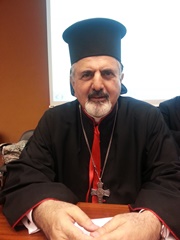|
Middle East - "Dialogue cannot stop extremists" "We Christians in the Middle East will have a future if the family of nations stand up for their principles, such as democracy and freedom, and especially religious freedom. Then we will be able to live in civilized countries. But this will take time." With these words, Syriac-Catholic Patriarch Ignatius III Yusuf Yunan addressed the global community. Talking to the international Catholic pastoral charity Aid to the Church in Need (ACN) the Patriarch, who lives in Lebanon, made clear recently that the nations represented in the UN Security Council in particular had a responsibility to exert political pressure on Middle Eastern states.
"Before it became rich from illegal oil sales, ransom payments or taxes, ISIS was financed from the Gulf states." Ignatius III stressed that in the areas conquered by ISIS there was sympathy for the extremists among Sunni Muslims. "Either they are forced to support the extremists or they support them willingly out of conviction." The Patriarch sees the roots of the broad support for extremism in the education system. "Children and young people are already educated in this spirit. Islam is presented to them as the superior religion. Others would have to follow it and submit to it." The Patriarch did not wish, however, to comment specifically on the US government's anti-ISIS strategy. "We bishops are neither military men nor politicians.” “ISIS must be stopped, by whatever means this may require. The extremists cannot be stopped by dialogue," Ignatius said. "Violence is essential. I cannot say what kind of violence, however." Archbishop Silvano Tomasi, representative of the Holy See at the United Nations in Geneva, made it clear to ACN that the international community bore a responsibility to help the persecuted Christians in Iraq. In the archbishop’s own words, "The international community must do two things. Firstly: we must boost the humanitarian aid as regards food, medications and items of everyday need. We must consider that winter is coming.” “Secondly, the international community must maintain political pressure so that the displaced persons will be able to return to their homes and possessions. That is why there is an obligation on the part of the world community to work to assert this right.” “Finally the international community should demand that weapons are not supplied to ISIS, nor should financial or political support be given or should there be economic relations such as that through the oil trade. Otherwise this terrorist gang, who use violence as a means to rule, will be strengthened." In answer to the question how far military force should be part of a strategy to combat ISIS, Archbishop Tomasi said, "Pope Francis said that the international community must stop the unjust aggressor. This is part of the Church's social teaching, according to which an unjust aggressor must be stopped and disarmed. But while the Church has to be a kind of conscience of the world community and demands action, the technical aspect is not part of its task.” “When we say that even violence may be used to stop the aggressor, this does not mean waging war. When a policeman uses force to safeguard order in a particular area this does not mean that he is declaring war on the people in that area.” “In the same way the international community should stop and disarm the unjust aggressor in order to bring order and peace to the areas in which these poor Christians are being persecuted. "
|
|
|

 "They must make clear to countries such as Saudi Arabia who support religious fanaticism that they must stop doing this," the Church leader said. It was Gulf states who had supported extremists such as ISIS. The extremists' ideology went back to Wahhabism, an especially radical form of Sunni Islam which was something like the official teaching in Saudi Arabia, the Patriarch went on to say.
"They must make clear to countries such as Saudi Arabia who support religious fanaticism that they must stop doing this," the Church leader said. It was Gulf states who had supported extremists such as ISIS. The extremists' ideology went back to Wahhabism, an especially radical form of Sunni Islam which was something like the official teaching in Saudi Arabia, the Patriarch went on to say.